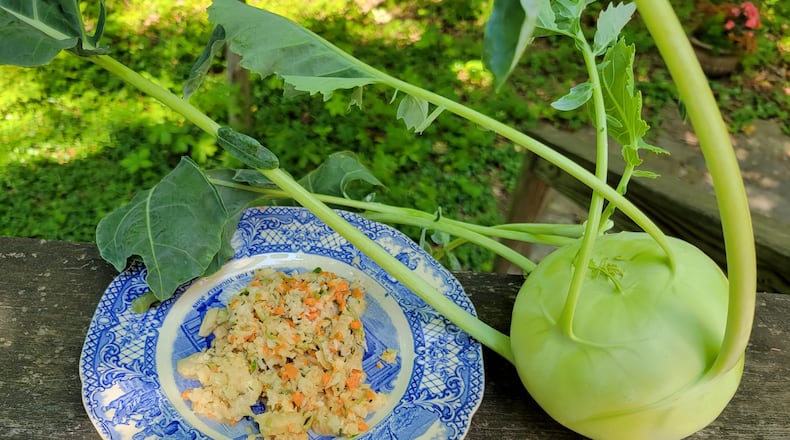Kohlrabi is yet another brassica, along with cabbage, kale, broccoli and so on. “Kohl” is German for cabbage and “rabi” is a variant on German for turnip.
Like other brassica, kohlrabi is a nutritional superstar. But the nutritional value of kohlrabi and other brassica degrades with time, so always opt for the freshly harvested local versions.
Kohlrabi and Brussels sprouts are said to be the only common vegetables that have North European origins. The first evidence of kohlrabi’s existence was recorded in Europe in 1554 by an Italian botanist Pietro Mattioli. Kohlrabi’s first evidence in the United States came in 1806, according to horticulturist Bernard McMahon.
To deconstruct a kohlrabi for eating, cut off the Sputnik antennas and chop the orb into a few wedges. The outer shell needs to be cut away with a knife, as it is too thick for a peeler.
The resulting white flesh has many uses. Kohlrabi can be eaten raw or cooked. My preference is to keep the kohlrabi raw as a basis for slaw.
This year, I pulsed chunks of kohlrabi in a processor along with a couple of local garlic scapes, a carrot, mint from the garden, and an assortment of leaves chopped off from parsley and other greens. I added a homemade vinaigrette, made with 1 part grapeseed oil, 1 part vinegar, 1 part water, and 3 parts olive oil.
Last year as a more colorful option, I sliced the kohlrabi into matchsticks and mixed with grated carrot and chopped purple cabbage. To moisten the kohlrabi slaw, I used 3 parts mayonnaise and 1 part Dijon mustard, along with some garlic, dill, Mediterranean herbs, and paprika.
Kohlrabi can be roasted like a potato. After preparing the kohlrabi as described above, cut into chunks like potato wedges.
Coat the kohlrabi chunks in oil and brown in the oven for 15 minutes at 450. Sprinkle with garlic and Parmesan cheese and brown for another 5 minutes.
I remember as a child being herded into the central hallway of my seven-room elementary school the day that the Soviet Union launched Sputnik 1. Our school principal turned on a TV and explained that Sputnik’s launch was a life-changing moment.
As I press “send” to transmit this column electronically to the Journal-News, I suppose my school principal was correct about Sputnik.
Meanwhile, why not try some local kohlrabi? German is a fine language, but giving attractive names to vegetables isn’t one of its assets. I prefer the French name – chou-rave – because if you actually try kohlrabi, you too will rave.
MOON Co-op is Oxford’s consumer-owned full-service grocery, featuring natural, local, organic, sustainable, and Earth-friendly products. The store, located at 516 S. Locust St. in Oxford, is open to the public every day. check it out online at mooncoop.coop.
About the Author
